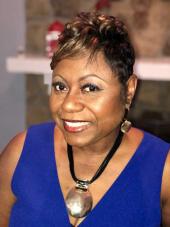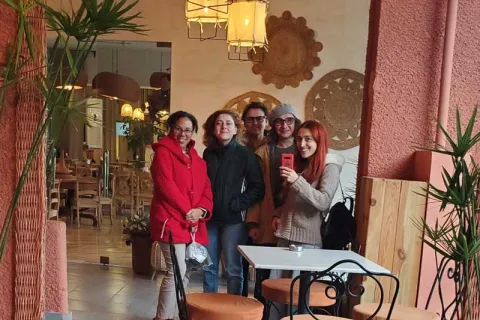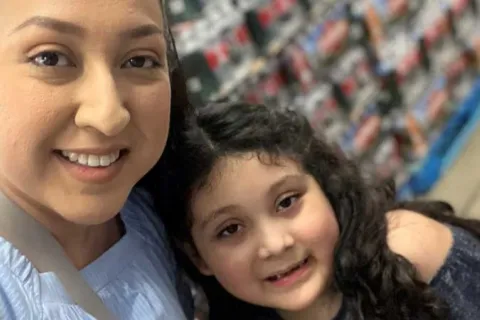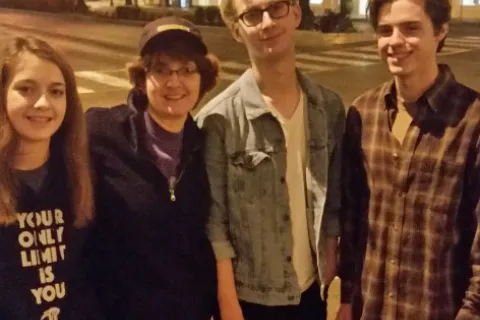Making progress toward the dream: Autism in the Black community
By Janet WilliamsJanet Williams, mom to a son on the spectrum and outreach director for Autism Speaks, shares her thoughts on breaking down barriers to autism diagnosis and care and the importance of connecting with impacted families across the vast autism community.
As we celebrate Dr. Martin Luther King, Jr.’s birthday, it’s almost impossible to think about this incredible person without remembering his famous speech, “I Have a Dream.”
As a Black parent of an autistic 10-year-old son named Jeremiah and as an outreach director for Autism Speaks, I am extremely grateful that I can actively support the autism community. Like many families, Black parents and caregivers have dreams for their autistic loved ones. But we are often faced with the reality that with our dreams may come additional barriers.
The Centers for Disease Control and Prevention (CDC) estimates that autism spectrum disorder affects 1 in 59 children in the United States. Among those children, Black children are diagnosed later than white children. This delay in diagnosis can lead to longer, more intensive intervention needs and difficulty accessing services. The good news is that we’re seeing rates of autism diagnosis across races and ethnicities closing—this is true progress. But there’s more work to be done.
Regardless of ethnicity, every person with autism experiences a unique set of strengths and challenges, as do those who care for and support them. But research tells us that Black people may experience greater barriers and stigmas associated with caring for a child with special needs.
Barriers and stigmas experienced by Black people caring for a child with special needs
- Poverty levels often are higher in Black communities than in white, non-Hispanic communities. And children of lower socioeconomic status are less likely to be evaluated and diagnosed with ASD than children of higher socioeconomic status.
- Individuals with ASD and their caregivers face higher costs for things like medical and health care services, therapies and supports, respite care and education than people not affected by ASD. They also face greater loss of productivity at work.
- There’s a lack of quality resources, such as medical providers, schools and inclusive community activities. There’s also a lack of support from our faith-based organizations.
- For some, there’s a feeling that we’ve either done something wrong or we’re not doing enough.
But while there are challenges, there is also hope.
My role at Autism Speaks allows me to connect with other Black families. As an outreach professional, I can offer opportunities to use our rich resources, such as our Autism Response Team. Importantly, families can see and connect with someone who looks like them. In my daily work, I am not afraid to share my personal experiences as a single parent of a child on the spectrum, or of being raised in an impoverished community. My experience is not much different than many other Black families with whom I often engage.
Resources if you think a loved one or yourself are autistic
Encouraging communities with trust issues can be challenging. But because of the experiences I’ve encountered in my own life, I know that understanding where a person comes from is imperative. When I walk into a room or stand in front of an organization to give a presentation, I encourage attendees who may suspect that a loved one, or even themselves, may be on the spectrum to:
- Learn the signs of autism and use the two-minute autism screening questionnaire. Knowledge is power, and early invention is key. If you’re concerned about your child’s behavior or development, check out our First Concern to Action Tool Kit for information about evaluation.
- Learn what to do after an autism diagnosis. Download our 100-day kit for families of young children or school-age children. These kits offer guidance and helpful resources for families.
- Find out about autism treatments. There’s no one-size-fits-all approach.
- Use our school-based resources, like our new digital Guide to Individualized Education Programs. And as you think about your child’s long-term goals, use our Transition Tool Kit to help you plan for schooling, employment and housing.
- Advocate for your child. Work with us on a range of policy issues that address the needs of autistic people. Download our Advocacy Tool Kit for information about developing skills to get services and supports for your family and the larger autism community.
- Get involved. Prior to employment at Autism Speaks, I was a three-year volunteer, with two of those years as the Atlanta Walk Chair. Although it may seem that you are alone, attending a Walk can help you quickly discover that there’s an entire community ready to welcome you. Also, learn about our faith-based inclusion initiative called Blue Blessings.
Our mission at Autism Speaks is to promote solutions, across the spectrum and throughout the life span, for the needs of people with autism and their families. We have a dream, too. And please--no matter what--hold on to your dreams: dreams of seeing your loved ones thrive, of being treated with dignity and respect, and of feeling loved and not judged.









